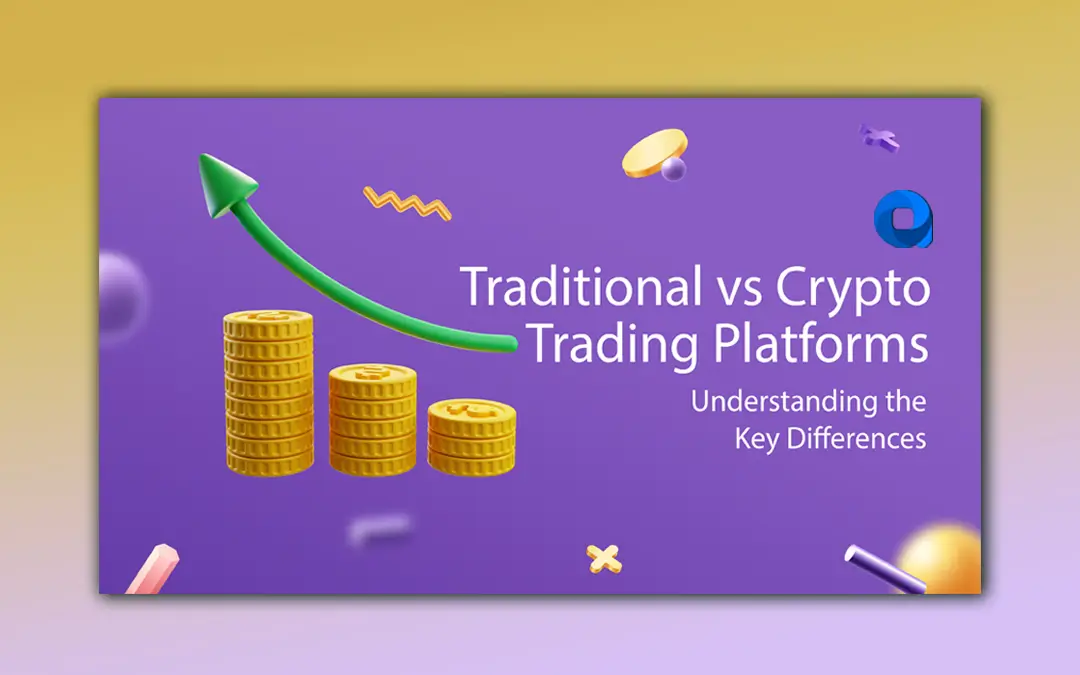Category List
Featured List


Traditional vs Crypto Trading Platforms
The rapid change in technology has influenced the way markets used to work. Many industries have now shifted from their traditional ways to digital methods. It helps them save time, effort, and money. One such industry is the trading industry.
In the past, investing was largely limited to stocks, bonds, and mutual funds—assets traded through licensed institutions and traditional brokers. But with the rise of cryptocurrency, a new model emerged: crypto trading platforms. These platforms revolutionized the process by allowing 24/7, global access to digital assets like Bitcoin and Ethereum, often without the need for a centralized authority.
Both types of trading have pros and cons. Traders should choose one of them based on their financial and trading goals.

Key Takeaways
- Traditional platforms involve buying and selling assets like stocks and bonds, while crypto trading platforms focus on buying and selling cryptocurrencies.
- Traditional platforms offer stability and regulatory protection, while crypto platforms offer accessibility and the potential for high returns.
- Traditional platforms can have higher entry barriers, and crypto platforms have higher regulatory risks and volatility.
- Investors place orders via traditional platforms. Then, platforms match buy or sell orders to make the trade happen.
- Crypto trading platforms allow investors to trade their digital currencies at any time they want.
- Regardless of the form, trading offers numerous opportunities to grow financially. But it is risky; so, novice traders should first analyze risks of the market. They should get sufficient knowledge and experience before entering the trading world.
What are Traditional Trading Platforms?
Traditional trading platforms have roots that stretch far back in history. People have been using them for centuries to trade financial instruments, such as:

- Stocks – It involves owning a small part of a company.
- Bonds – It is about giving a loan to a company, and then getting back the loan amount with the interest.
- Mutual funds – They gather money from many investors to invest in different assets managed by professionals.
- Exchange-traded funds (ETFs) – This kind of investment holds different assets and trades on the stock market.
Traditional platforms are controlled by the administration and financial authorities. Therefore, they are considered safe and stable. Some examples of these platforms are:
- E*TRADE
- Fidelity
- Charles Schwab
- TD Ameritrade
What are Crypto Trading Platforms?
These are online marketplaces where customers trade digital currencies. They check market prices and make predictions. And, then they buy or sell currencies when they think they would be able to make the highest profit.
The trade of traditional assets is usually done with the help of mediators like banks, etc. However, the exchange of crypto is done without them. Hence, it is cheap and fast.

Crypto trading platforms offer various features, such as:
- Spot trading – It is about trading financial assets for instant delivery.
- Futures – It is the contract about selling or buying a currency at the specified rate and selected time.
- Decentralized exchanges (DEXs) – These platforms allow private, secure, and fast peer-to-peer transactions.
The following are some popular traditional platforms based on on Coin Market Cap:
Platforms You Can Use for Options Trading
Several top-tier crypto trading platforms have expanded to include options trading, giving users access to derivatives on major digital assets like Bitcoin and Ethereum. Here’s a look at the standout platforms for trading crypto options :
Bybit
Bybit enables options trading for Bitcoin, Ethereum, and Solana. It's known for its strong liquidity, customizable trading parameters, and low entry fees, starting at just 0.02%. One major draw for many users is the ability to trade without completing KYC verification, though withdrawal limits are in place for unverified accounts.
Binance
Binance covers options contracts for a wide range of coins, including Bitcoin, Ethereum, Solana, Dogecoin, XRP, and BNB. It offers an extensive list of strike prices and expiry choices, making it appealing to both casual and professional traders. Fees are set at 0.03% per trade. Unlike some platforms, Binance requires all users to complete full KYC verification to access trading features.
OKX
OKX supports options trading for Bitcoin and Ethereum, providing both streamlined and advanced trading interfaces. It caters well to beginners with its intuitive layout but also includes tools sophisticated enough for experienced traders. OKX maintains competitive fees—0.02% for makers and 0.03% for takers—while striking a balance between ease of use and trading depth.
These platforms stand out not just for the assets they offer but for how they structure their markets, cater to different experience levels, and manage access through KYC policies. Whether you're testing options for the first time or executing complex strategies, each platform brings something different to the table.
Market Hours and Access
A major advantage of crypto platforms is that they operate non-stop. The cryptocurrency market never closes, offering opportunities every hour of every day. In contrast, traditional trading platforms are restricted by business hours and often shut down on weekends and holidays.
This around-the-clock access has helped make crypto exchange platforms popular among global traders who want real-time engagement with market movements.
Intermediaries and Control
Traditional crypto trading often requires going through banks or licensed brokers. These intermediaries can slow down transactions and impose restrictions on how assets are accessed or moved.
In contrast, crypto exchanges—especially decentralized ones—eliminate the middleman. Users manage their own accounts, maintain custody of their assets, and can execute trades directly with other users.
Still, this added control comes with responsibility. Crypto platforms require users to understand wallet security, private key management, and the risks of hacking. Compared to traditional platforms, where institutions offer insurance and support, crypto platforms put more emphasis on user-led security.
Altrady as a Top Choice
Altrady stands out as a top choice for crypto traders because of its easy-to-use platform and its broad range of trading tools. It’s popular among more than 80,000 users who appreciate the platform's smart trading bots and automation features that cater to both short-term day traders and those with long-term strategies.
What sets Altrady apart even more is its free paper trading plan, which allows traders to practice their strategies risk-free indefinitely.
Differentiate Between Trading and Crypto Trading Platforms
- Market hours: Traditional markets open for a specified time each day. Crypto markets stay open throughout the day, every week.
- Assets traded: Traditional trading platforms are used to sell or buy assets like bonds, stocks, gold, etc. On the other hand, crypto trading is about investing in digital currencies.
- Regulation: Traditional platforms are overseen by financial regulators; hence, they are more stable and transparent. Crypto platforms are less regulated, increasing the risk of fraud and manipulation.
- Global reach: Most crypto platforms can be used anywhere in the world. On the other hand, traditional platforms are restricted to specific regions.

Comparison Table of Features Between Traditional and Crypto Trading Platforms
| Feature | Traditional Platforms | Crypto Platforms |
|---|---|---|
| Market Hours | Limited hours | 24/7 |
| Global Reach | Region-specific | Global |
| Transaction Speed | Moderate to slow | Fast |
| Regulation | Highly regulated | Less regulated |
| Privacy | Varies | High |
Pros and Cons of Each Platform
| Platform Type | Pros | Cons |
|---|---|---|
| Traditional Platforms | Secure, reliable, well-regulated, varied asset trades, strong history | Technological adoption slow, limited trading horus, slower regulatory processes |
| Crypto Platforms | Fast, operates 24/7, global access, low transaction fees, investor privacy | High volatility, lack of regularity policies, high risk of cyber-attacks |
Crypto Exchange vs Crypto Trading Platform
Terms like crypto exchange and crypto trading platform are often used interchangeably. But they’re not the same, and understanding the difference matters, especially if you’re serious about navigating the crypto market with confidence.
A crypto exchange is a digital marketplace where users can buy and sell cryptocurrencies like Bitcoin, Ethereum, and others. Think of it as a currency exchange booth at an airport, but instead of swapping dollars for euros, you're swapping fiat money or one cryptocurrency for another. These platforms are straightforward: you place an order, the exchange matches it with another user, and the trade happens. Popular examples include Coinbase, Binance, and Kraken.
A crypto trading platform, on the other hand, offers more advanced tools for traditional crypto trading. These platforms are often used by experienced traders looking to speculate on price movements without necessarily owning the actual coins. Many offer features like leverage, short selling, and algorithmic trading. While some trading platforms also function as exchanges, their primary focus is on strategy and market positioning, not just asset swapping.
When compared to traditional investment options, crypto platforms differ in speed, access, and decentralization. In the world of traditional brokers, assets like stocks and bonds are traded during limited hours and often come with higher fees. But with crypto, markets run 24/7, giving traders constant access to opportunities.
The traditional vs crypto trading platforms debate often centers on control. Traditional crypto platforms (those operated by brokers) tend to hold users' funds and offer limited withdrawal options. In contrast, decentralized crypto exchanges give users more control but come with their own risks, such as lack of customer support and regulatory oversight.
Conclusion
Both traditional and crypto trading platforms have their own value. While traditional platforms are older and controlled, they lack global availability and have limited trading hours. Similarly, crypto trading platforms are fast and newer but have high volatility, requiring quality risk management strategies.
Both trading forms have unique pros and cons.
Understand their mechanisms, markets, and features to determine which best suits your trading goals.
Traditional platforms bring structure, reliability, and institutional support. Crypto trading platforms offer speed, innovation, and global access. Whichever route you take, it’s critical to understand the tools, risks, and rewards involved.
Before funding your accounts or placing your first order, learn the mechanics of each platform, understand your market, and develop a solid security strategy. Whether you're building wealth through bonds or betting on the next Ethereum rally, the trading world has never offered more options—or more power in the hands of the investor.





























